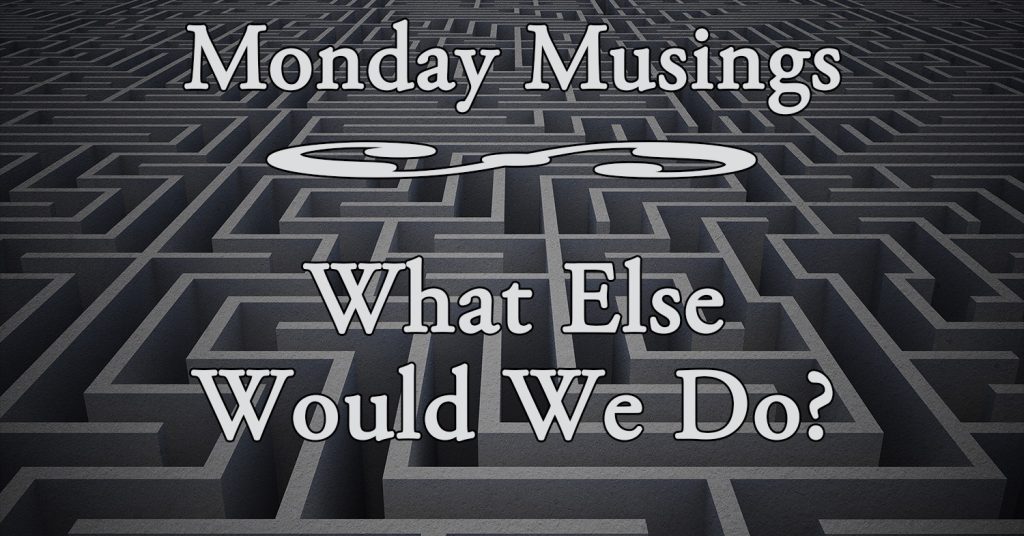Share This Musing
Musing: What Else Would We Do?
Flashes of lightning slithered across the black sky. Claps of thunder bounced off the mountains and rattled the windows. Torrential rain cascaded in a blinding deluge.
We were about to leave for a restaurant when the storm hit, but we waited in the safety of the house. Summer storms, after all, rarely last long. This one was no different. It was over as quickly as it began.
The clouds parted. Streaks of sunlight peeked through. Thick, heavy steam rose off the wet pavement.
Our slightly delayed dinner plans were back on, but we guessed the interstates would be jammed because of the weather. Not wanting to sit in traffic, we asked ourselves, what else would we do?
We opted to go to a sports bar just a few blocks away. Dozens of TVs mounted on the walls. An even broader selection of craft beers on tap. A menu ranging from burgers to salads. A solid choice for a quick, mid-week meal.
When we stepped from the stifling humidity into the cool air of the restaurant, though, something seemed off.
The TVs still flickered. Music played over the speakers. Staff clustered and gossiped. But only a few customers were scattered about the cavernous room.
The hostess greeted us with an explanation. “The storm knocked out our Wi-Fi. The manager is working on it.”
That seemed a strange reason for a light crowd in a sports bar. Friends. Food. Beer. TVs. And if we really needed to check our phones for something, what else would we do? Use a cell signal, of course.
But as soon as we settled into our seats in the middle of the nearly empty restaurant, the server approached and repeated the warning. “They told you the Wi-Fi was out, right?” When I nodded, she said, “Let me bring you water.”
Water was great, but we wanted more. I ordered a favorite brown ale for me and a glass of wine for my Ever-Patient-Partner-In-Life.
A look of consternation crossed the server’s face. She spoke slowly, as if explaining something to a child. “I can’t. The Wi-Fi is out.”
On the far side of the large restaurant, the bartenders leaned against the counter, chatting between themselves. They weren’t hustling to fill drink orders like they normally would be. But my attention went behind them to the long row of beer taps stretched along the wall. What does the Wi-Fi have to do with drawing a beer or pouring wine?
She tilted her head toward a computer screen at the server station. Other members of the wait staff stood around it talking with each other. “I can’t put the order in the system without Wi-Fi.”
At least I now understood the warnings of a lack of Wi-Fi. Well, sort of understood. After all, molten lava didn’t bubble up from the floor between our seats and the bar. Nor did a moat filled with hungry alligators block the path. “You can’t just give the order to the bartender?”
“No. I’m required to input the order into the computer. The bartender can’t pour the drink until it’s done.”
I glanced through the open kitchen doors and spied the cooks leaning against prep tables. No food was being prepared. “I’m guessing you can’t take food orders either until the Wi-Fi is back.”
She shrugged.
Sitting at the table without drinks and food didn’t sound appealing, so I asked myself, “What else would we do?” I had a feeling I knew the answer, but I asked, “Can we sit at the bar and order drinks there?”
“They still can’t serve you without entering the order in the system. Besides, without the Wi-Fi, we can’t take credit cards.”
“Not a problem. We have cash.”
“Doesn’t matter. We can’t create a bill without the computers. We’re not allowed to do anything without inputting the orders.”
Please let me be clear. The server was following her employer’s rules. I don’t blame her.
Management had defined the problem as a lack of Wi-Fi and was trying to fix that. The actual problem, though, was different. The manager should have asked, “How do we take care of customers without the computers?”
Defined that way, solutions appear to the question, “What else would we do?”
Countless bars serve drinks without fancy computer systems. Numerous diners operate their entire business with paper pads.
As evidence, let me take you back to September 22, 1989.
Oddly specific date, isn’t it? To most of you, it might seem like I picked it randomly from a calendar. For anyone who lived through it, though, they will remember it as the day Hurricane Hugo struck.
Streets were impassable. Power was nonexistent. And we lived in Charlotte, far from the coast.
Hugo was still a Category 1 hurricane as it tore across the city. I can’t even imagine what life was like in McClellanville, which was at the epicenter of the behemoth when it slammed into the South Carolina coast.
We lived in an apartment near Eastland Mall, a baffling residential choice since I had to commute on the traffic-choked Independence Boulevard to get to my job across town beside the New Coliseum.
That might be the most Charlotte sentence ever, though if you don’t know the city, you won’t understand the joke.
Eastland Mall was abandoned a long time ago and then torn down. Independence Boulevard doesn’t exist anymore, replaced by Independence Freeway.
And the New Coliseum? Everyone referred to the officially named Charlotte Coliseum as the New Coliseum to distinguish it from the Old Coliseum. But don’t try to find the New Coliseum if you visit. They tore it down over 15 years ago and replaced it with the New New Coliseum, now called the Spectrum Center after a few name changes.
The Old Coliseum still stands and changed its name to Independence Arena… and then Cricket Arena… and, now, the Bojangles Coliseum.
Confused? That’s Charlotte. Everything changes… except it’s still traffic choked.
Back to our story.
As twenty-somethings, my Ever-Patient Partner and I were ill-equipped for a natural disaster like Hugo. We had almost no food, but couldn’t cook anyway because the electric stove didn’t work without power. We couldn’t drive anywhere because the roads were blocked. Even if we could leave our apartment, there was nothing open to drive to. Our plan was to eat cold canned food because what else would we do?
Thankfully, the answer came from our neighbors. Residents in the apartment complex rolled grills out to the parking lot. Those who had food in their freezers, food that would spoil without power to keep it cold, brought it to the impromptu gathering. We sat outside that first evening and ate a smorgasbord courtesy of people we barely knew just a day earlier.
The next day, we needed to stock up, but that was still challenging, with barely passable roads and power not expected in most of the city for days. The first grocery store we went to was closed. They had no way to run the cash registers.
The second grocery, though, was different. The manager had scrounged up flashlights, calculators, notepads, and pens. Employees illuminating the way with flashlights escorted customers one at a time into the dark store. As they loaded their cart, the employee tracked their purchases on the pads of paper. When they returned to the front, another employee used a calculator to total the bill. Customers paid with cash.
The manager explained, “Hardly a perfect system, but what else would we do? People in the surrounding neighborhoods are hungry.”
On our way home, we ran into an even greater stroke of luck. A hand-painted banner stretched in front of a packed parking lot of a Mexican restaurant. “All you can eat—five dollars.”
We couldn’t pass up a hot meal.
People sat at tables lit by flickering candlelight. A long buffet waited at the center of the building, food being kept warm with propane cookers. Employees bustled from the kitchen with overflowing trays prepared on the gas stoves. The owner stood at the front door collecting five dollars from each person and directing them to vacant seats as soon as another guest departed.
A couple stood with their children in front of the owner. With tears in her eyes, the mother explained she didn’t have cash. The ATM wasn’t working. And…
The owner raised his hand and stopped her. “Go. Eat. After the power comes back in a few days, come pay.”
Did she? I don’t know. The owner didn’t record her name. Nor did he refuse anyone else in the same predicament. I’m sure some people took advantage, but most probably came back to pay. Quite a few of those became regular customers.
But, he explained to us, that wasn’t what mattered. He wasn’t doing it for future business. “People are tired and hungry. The food here would just go bad if we didn’t serve it. And my people? They need to get paid. What else would we do?”
Indeed. What else?
That was the spirit of the days after Hurricane Hugo. Neighbors sharing their food and company. Grocery stores figuring out how to distribute their wares. Restaurant owners taking care of their customers and employees. Each of them asking themselves, “What else would we do?”
Which brings us back to the present day and our dinner the other night. It was delicious. At another restaurant.
The first place had food. Drinks. Power. Employees who could cook and serve.
But they didn’t have Wi-Fi because of a thunderstorm. And because they didn’t have Wi-Fi, their computer system didn’t work. Without their system, they didn’t serve customers. Food went to waste. No revenue came in. Employees didn’t earn tips.
The manager on duty that night should have asked, “What else would we do?”
Gratuitous Dog Photo: The Trouble Brothers

Typhoon stands while Roscoe sprawls in the grass, just a minor pause between wrestling matches.
Until Next Monday
If you find yourself facing a roadblock, ask, “What else would we do?”
If you have questions or thoughts, drop them in the comments below.
Have a terrific week. See you next Monday.
7 Comments
Leave a Comment
Subscribe to the Random Musings
Want to be sure never to miss a Musing? Subscribers will be notified when I post a random observations on life or a short story. The email is absolutely FREE and you my unsubscribe at any time.
Current Reader Survey Question
Enjoyed the Story? Try a Short Story
Secrets, passions, and a reunion that changes everything
Benjamin Walsh sees his wife, Nicole, walking down a city street. With her busy schedule at work, he doesn't know how she found time to get away, but tries to catch up to say hello.
To his surprise, she greets an old friend of hers, Eduardo Rivera. Eduardo left town two decades earlier to pursue a theatrical career in New York. What is he doing back?
Benjamin is shocked when Eduardo and Nicole embrace. They disappear through a door together. With understanding of what is happening, Benjamin realizes he has only one choice.
Publication Date: February 6, 2024
Format: E-book (EPUB, MOBI, PDF)
Pages: 38
Price: Pay what you want (Minimum 99¢ to cover processing costs)




Obviously, the first restaurant didn’t have a Plan B. The younger people literally don’t remember a time without the Internet, and wifi, let alone computers.
I wonder if their management came up with one after that?
And I bet most of the people who ate at the Mexican restaurant without paying did come back to pay. And to dine. And told their friends about it.
That is really FOOD for thought! The managers (or owners) of these restaurants who came up with the plans to bring in furture customers were the BEST! I’m lucky I can remember 1989!
Love the bestest brothers relaxing in between wrestling matches!
It is food for thought. And I appreciate the people who are willing to think “beyond the wifi.”
It is funny how a date sticks in your mind, 10/4/87 is mine. Early snowstorm knocked out power all over the northeast. I think too much depends on the internet now. I tried to get a simple coffee at McDonalds and was told to use a kiosk to order. The brothers are so cute when they are at rest.
This definitely is poor management but also makes me wonder how\why this is the practice. Can the manager not trust the employees to know the difference between a power\wifi outage or an employee giving away free drinks or meals to have this strict of a rule. Or did the employees take the manager’s directive too literally? So many questions. The funniest part is it seems the staff were enjoying their paid break. As someone that has provided automation to Ops areas and then had a technology outage, it’s not fun dealing with those users when it breaks and they have to go back to manual processes but these folks didn’t seem to care.
So sad that people have no clue what to do when wi-fi is not working. That is why it is not a good thing to have everything depend on wi-fi. I get that alot when told that I cannot do anything unless I scan it in on my phone. I tell them I do not own a cell phone and will business elsewhere.
Like Susan said, a plan B should be in place. Power disruptions may be more common than not going forward. When we think we’re making things easier, we may be painting ourselves into a corner.